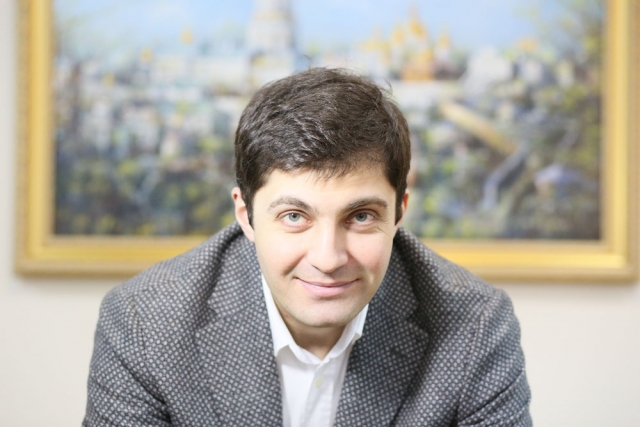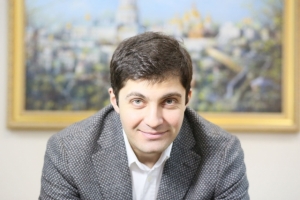Georgian-born Sakvarelidze Sacked by Ukraine’s Disgraced Prosecutor General
KYIV – Ukraine’s Georgian-born Deputy Prosecutor General David Sakvarelidze was suddenly relieved of his duties on Tuesday by his superior, Viktor Shokin, just hours before Shokin was himself voted out of office by Ukraine’s parliament, the Verkhovna Rada.
Shokin’s decision to dismiss Sakvarelidze has been widely panned by the Ukrainian media and the country’s Western-leaning reformist politicians who accuse Shokin of political grandstanding at a time when his much-maligned tenure as the country’s chief law enforcement official appeared to be at an end.
International observers - including top US and European officials - have sharply criticized the decision, saying the move is a major blow to the clean government reforms that Kyiv has struggled to implement since the 2013-14 Maidan Revolution ousted former pro-Russian President Viktor Yanukovych.
Frustration from Key Allies
The sharper tone from Shokin’s critics comes amid a growing chorus of frustration from Ukrainian and European officials who have in recent months accused Shokin of intentionally sabotaging anti-graft investigations and the prosecution of those responsible for the deliberate killing of more than 100 Maidan protestors by Yanukovych’s Berkut riot police in January-February 2014.
During a December 2015 visit to Kyiv, US Vice President Joe Biden said corruption emanating from the prosecutor general’s office was eating away at Ukraine’s key reform attempts “like a cancer.”
Foreign creditors have long complained about high-level corruption in the prosecutor’s office, a Soviet relic that provides unprecedented power to one individual over the country’s court and prosecution system.
International Monetary Fund (IMF) Director Christine Lagarde reiterated their frustrations in February when she said that the lack of progress in fighting government corruption in Ukraine meant that the IMF might be forced to halt the support program that has kept the country afloat for the last two years
High-Level Corruption
The corrosive influence Shokin exerted on Ukraine’s judicial process has been blamed by top Ukrainian officials, including Sakvarelidze and former Georgian President-turned Odessa Governor Mikheil Saakashvili, as having played a major role in derailing the government’s reform efforts; most of which have been hobbled by bureaucratic infighting and blatant power grabs by Ukraine’s Moscow-backed oligarchs, whose business interests are closely tied to Shokin’s.
Shokin’s own subordinates have been linked to several cases involving stolen funds donated by Western lenders and earmarked for the implementation of reformist policies and privatization projects.
In one high profile case, huge sums of cash and a trove of diamonds were found alongside personal documents with Shokin’s signature in the homes of two of his top lieutenants, indicating that they had taken bribes with Shokin’s blessing.
When a prosecutor in Shokin’s office attempted to bring the case to trial, members of the staff with either fired or forced to resign.
Committed Reformist vs Soviet-style Functionary
The outgoing Sakvarelidze, with whom Shokin frequently feuded, said he was relived of his duties after calling into question the loyalties of certain members of the prosecutor general’s office, whose staff is mainly made up of officials tied to the former Yanukovych government and Russia’s intelligence services.
Sakvarelidze also claimed that Shokin refused to comply with Ukraine’s post-Maidan Revolution lustration law that requires all Yanukovych-era officials to be dismissed from government positions.
Shokin, for his part, justified his decision to sack Sakvarelidze after he accused the latter of breaking with professional protocol when he attended a recent rally that called for Shokin’s resignation.
Sakvarelidze’s Future
Despite Shokin’s dismissal and a statement from Ukrainian President Petro Poroshenko that he would personally ask Sakvarelidze to remain as the country’s deputy prosecutor general, his future in the current Ukrainian administration remains in question.
Just hours after being relieved of his duties as deputy prosecutor general, the Odessa Region’s legislature voted to dismiss Sakvarelidze as its chief prosecutor.
The region’s pro-Russian Yanukovych-era lawmakers failed to provide a justification for their decision other than to state “general displeasure” with Sakvareldze’s job performance.
In a statement to the Ukrainian media on 31 March, Sakvarelidze said he had no intention of returning to Odessa to serve as the prosecutor general of an endemically corrupt office.
"I'm not going to run to the (Odessa) prosecutor's office, as it is staffed by people from the old Yanukovych system who have no intention of going anywhere and who are protected by vested interests. There’s no point to go back an engage in further self-deception," Sakvarelidze said.
Young Reformer
Sakvarelidze, 34, made a name for himself as one of the leading young reformers in former Georgian President Mikheil Saakashvili’s administration as first deputy prosecutor general from 2008-2012 and later as an opposition member of parliament from 2012-2015.
The Tbilisi native first appeared on Ukraine’s political scene during the height of the Maidan Revolution; one of the hundreds of Georgians who came out in support of the movement’s attempt to break free from a corrupt, Russian dominated political system.
Poroshenko’s presidential administration later invited Sakvarelidze to join the new reformist government, granting him Ukrainian citizenship in the process.
His former patron and close ally, Saakashvili, appointed Sakvarelidze as Odessa’s top law enforcement official in September 2015.
Sakvarelidze’s firebrand rule-of-law policies quickly found favor with many of Kyiv’s leading pro-Western activists, but consistently clashed with the remnants of the old guard in Ukraine’s notoriously combative body politic.
By Nicholas Waller












